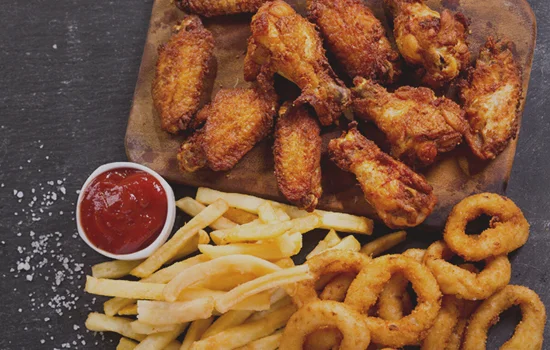
While an unhealthful diet may cause nothing more than a few uncomfortable hours, eating the wrong foods over a long time can lead to more severe complications. As a primer on foods to avoid, or at least reduce, listed below are the ten worst foods for digestive health:
1. Grease
Fried food is at the top of most gastroenterologists’ worst food lists because it is difficult to digest. If you have the slightest digestive sensitivity, fried food can kick off a bout of heartburn and acid reflux. Some of the worst offenders are French fries, fatty steaks, and deep-fried anything.
2. Processed Food
The carbohydrates in refined foods — like chips, soda, and white bread — move through your digestive system quickly, leading to symptoms like bloating, cramping, and gas. The high fat and calorie content don’t do much for your weight and blood sugar levels either.
3. Chili Peppers
You might enjoy the sweat they stir up, but spicy peppers can cause heartburn for hours after you eat them. Hot, spicy foods are particularly dangerous for your digestive system when you eat them close to bedtime or when you lay down.
4. Chocolate
Yes, that sweet tooth you indulge in is affecting more than the size of your thighs. Chocolate can trigger digestive symptoms like heartburn and an upset stomach, especially if you have a disorder. For some people, it can even cause diarrhea and loose stools.
5. Artificial Sweeteners
While you think you’re doing your body a favor by shaving calories off your intake, your digestive system suffers when you substitute artificial sweeteners for natural sugar. The pink, yellow and blue packets contain ingredients that can cause bloating, diarrhea, and gas.
6. Alcohol
It’s not technically food unless you consider the three-martini lunch. Even drinking alcohol in moderation can relax the sphincter in your esophagus, causing heartburn or acid reflux. Too much alcohol can inflame your stomach lining, negatively affect your liver, or lead to diarrhea. It also can prevent you from absorbing nutrients properly.
7. Corn
Too much of anything is bad for digestion, but corn in large amounts can lead to significant gastrointestinal symptoms because of its high cellulose content. The human digestive tract cannot break down cellulose. Corn passes through your system undigested; as such, it can cause cramps, abdominal pain, and gas in the process.
8. Coffee
Again, while it’s not food, coffee deserves a spot on this list. Coffee so irritates the stomach lining that nearly 40 million Americans have kicked the habit. Coffee can cause heartburn, acid reflux, and bowel habit– among other things. Different foods affect people differently.
9. Acidic Fruits
Just the name alone conjures up visions of acid reflux — and for a good reason. Oranges, grapefruit, tomatoes, and lemons are high in acid. Overeating acidic fruit leads to a condition that carries its name. Eating these fruits on an empty stomach irritates your stomach lining even more.
10. Raw Vegetables
Even though you may know about the many health benefits of crunching raw veggies, you can expect to pay an intestinal price for over-indulging in practice. Raw vegetables contain a lot of insoluble fiber that, like corn, can cause bloating, gas, diarrhea, and cramps when they pass through your system undigested.
Use caution when trying new food. If you have a diagnosed digestive condition, pay attention to what you eat. Sufferers of GERD, colitis, Irritable Bowel Syndrome, or Celiac disease, for example, already know to avoid fried and fatty foods. Book an appointment with your doctor if your symptoms last for more than a day. Getting a proper diagnosis is the first step to making healthier choices in the future. Contact NYC Gastroenterologist to schedule an appointment to see one of our gastroenterologists or more information on unhealthy foods for your digestive health.
About Us
The GI team consists of well-known researchers and highly skilled experts in the prevention, diagnosis, and treatment of digestive disorders. In Midtown Manhattan and the Upper East Side, our gastroenterology practice provides the most technologically advanced, safest, and time-tested treatments in a friendly and compassionate environment.

